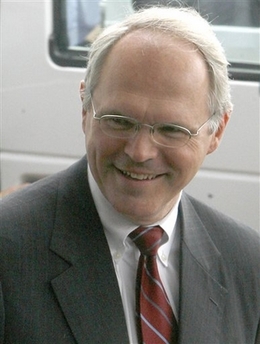US, N.Korea nuclear envoys meet in China
(AP)
Updated: 2007-07-17 16:02
Updated: 2007-07-17 16:02
BEIJING - The chief US nuclear envoy met Tuesday with his North Korean counterpart ahead of the first six-nation talks on Pyongyang's nuclear program since DPRK shut down its sole operating nuclear reactor.
 United State's chief negotiator Christopher Hill arrives at the airport in Beijing, China, Tuesday, July 17, 2007. Six-party talks are expected to resume at the Chinese capital. [AP]  |
"We just had a nice lunch, not a lot of specific discussions," Hill told reporters outside a restaurant in the Chinese capital. "The atmosphere was very businesslike."
Hill said he would meet Kim again later Tuesday before the countries - along with China, Russia, Japan and South Korea - open formal arms talks Wednesday.
Kim declined in brief comments to give any specifics of his meeting with Hill, saying after the lunch that the two "had a casual talk."
The shutdown of the Yongbyon reactor was North Korea's first step toward halting its nuclear program since the nuclear standoff began in late 2002.
Talks this week were expected to focus on having North Korea's pledge to declare all its nuclear programs and then disable them so they cannot be easily restarted - followed by their eventual dismantlement.
Before leaving Pyongyang, Kim told broadcaster APTN that closing the reactor meant the process was moving into a second phase.
"There should be discussion on how to define the targets of the second phase, the obligations for each party, and also the sequence of the actions," he said at the airport.
South Korean nuclear envoy Chun Yung-woo said the closing of the nuclear reactor was important, but only a first step.
"There is a very difficult and steep road ahead of us. We need to make sure that North Korea won't become hesitant or lose interest in going up that difficult and steep road," he said after arriving in Beijing.
State Department spokesman Sean McCormack told reporters in Washington that the next stages in disarmament are going to be hard, but that the US wants to see things move ahead "with some rapidity."
When asked about North Korea's demand it be removed from a list of terrorism-sponsoring states, McCormack said it would be important for North Korea to continue to work with Japan on an abductions issue.
Japan has opted out of the aid provision part of the February deal, citing a lack of progress by North Korea in resolving the abductions of its citizens by Pyongyang during the 1970s and 1980s.
|
|
|
||
|
||
|
|
|
|